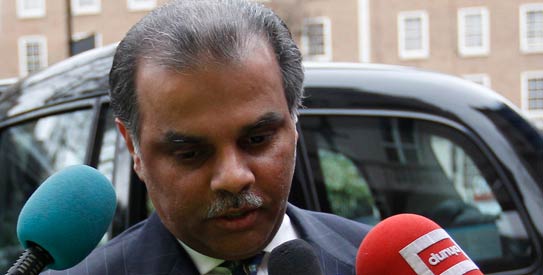
ISLAMABAD: Pakistani-American Mansoor Ijaz’s non-revelations continued on Thursday.
In his testimony, he said that he delivered the memorandum to admiral Mike Mullen, the former US military chief, after he was convinced that former ambassador Husain Haqqani enjoyed the support of President Asif Ali Zardari on the matter. Ijaz, however, alleged that Mr Haqqani and his counsel wanted to conceal the facts at present.
He said this while recording his testimony before the three-member commission, comprising Balochistan Chief Justice Qazi Faez Isa, Sindh High Court Chief Justice Musheer Alam and Islamabad High Court (IHC) Chief Justice Iqbal Hameedur Rehman, via video link from London.
On Thursday Ijaz provided details of the events from May 9 to May 12, a period during which, according to him, he drafted and delivered the memorandum. The proceedings went on for five hours.
He said the memo was delivered to Mr Mullen on May 10 and on May 12 Haqqani informed him that “a call will go out from the US president to the GHQ in Rawalpindi soon”.
He said the US officials were more interested in ensuring that the memo had the backing of Mr Zardari.
He had conveyed to Mr Haqqani that Gen Jones had made it clear that no verbal message would be conveyed to the American government.
Ijaz added that Gen Jones made it clear that it was hard to believe that anyone in Pakistan could deliver on the agenda presented in the memo.
According to Mansoor Ijaz, Haqqani, in exchange for US support for the civilian government, had offered to eliminate section ‘S’ of the Inter Services Intelligence (ISI); assist in locating people such as Mullah Omar and Ayman Al-Zawahri; allow more US boots on Pakistani soil; provide access to the three wives of Osama bin Laden; promise cooperation in the Mumbai attacks investigation; and introduce additional disciplines for the nuclear programme.
Ijaz said he had asked Haqqani if he had the permission of the ‘Boss’ (President) for the memo to which the former ambassador had said yes.
The businessman added that he did not hide anything from the commission and even waived his privacy rights, but that Haqqani did not surrender his Blackberry handset or waive his privacy rights.
He alleged that Haqqani and his lawyer wanted to conceal facts and were not interested in the truth.
Mansoor Ijaz said he would also tell the commission on Friday about the developments that took place in October and November over the memorendum.
WARNING TO MEDIA: Apart from Ijaz’s testimony, the commission took notice of the television footage of the court room and its proceedings on various TV channels, warning the media against doing this again.
In addition, it also disposed of three applications of Haqqani’s counsel advocate Zahid Bukhari.
Advocate Bukhari had requested the commission that before cross examining Ijaz, the evidence he produced be sent for forensic tests. He also requested that he (Bukhari) be provided the evidence and that the government make arrangements for his London visit.
The commission directed Ijaz’s counsel, advocate Akram Sheikh, to supply the relevant record to advocate Bukhari.
However, the commission observed that this was not the right moment to get the evidence tested.
Attorney General Maulvi Anwarul Haq told the commission that Ijaz had submitted the evidence of the electronic devices and that under article 78 of the law of evidence, Ijaz must prove the authenticity of his sources.
Advocate Sheikh, on the other hand, told the court that under the electronic transaction ordinance of 2002, the commission’s secretary, who was sitting with Ijaz at the Pakistani High Commission in London, could verify the authenticity of the communication after checking the email.












































Dear visitor, the comments section is undergoing an overhaul and will return soon.